

Third conditional lesson. This lesson aims to revise the form of the third conditional.
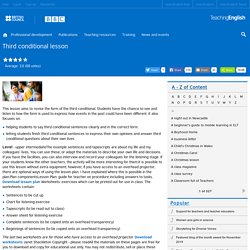
Grammar: teaching conditionals. By Jim Scrivener Conditional structures that begin If + present tense offer lots of possibilities for interesting tasks, presentations or practice activities.
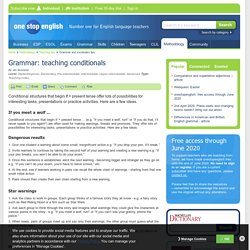
6 new ways to play a Quizlet Live game - Ditch That Textbook. Vocabulary is important for every subject and even more so in the age of high stakes testing.
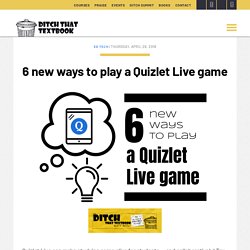
Early on in my teaching career, I moved rather quickly towards using Quizlet to create and manage the vocabulary that my students would need to learn. Quizlet is by no means limited to just vocabulary though; as study questions, diagrams, pronunciation, and pictures make it a powerful tool. Business Top Trumps. Weak forms. This site uses cookies to help make it more useful to you.
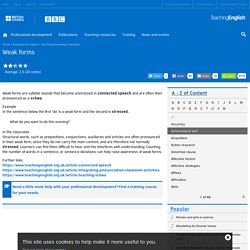
Find out more about cookies. Skip to content Weak forms are syllable sounds that become unstressed in connected speech and are often then pronounced as a schwa. DIFFERENCE BETWEEN IDIOMS AND PHRASAL VERBS - Knudge.me. Before we get to the difference, let us first discuss what a verb is.
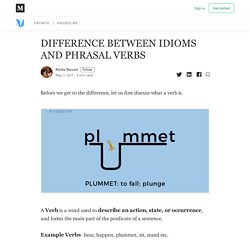
A Verb is a word used to describe an action, state, or occurrence, and forms the main part of the predicate of a sentence. Example Verbs- hear, happen, plummet, sit, stand etc. Whereas a Phrasal Verb is a phrase which consists of a verb in combination with either an adverb or preposition or both preceding or succeeding it. The meaning of the phrasal verb is different than that of its constituent parts. phrasal verb = verb + adverb/preposition. Online Text To Phonetics. ENGLISH ESL, EFL worksheets made by teachers for teachers (x83841)
Online Text To Phonetics. Search Results for “phrasal verbs” – Page 2. TEFL A-Z - Eslbase.com. Search Results for “phrasal verbs” – Page 2. Teaching English Pronunciation Skills. ToPhonetics. The Present Perfect Progressive Tense (#1), by Dennis Oliver - Free English Grammar Lessons. The present perfect progressive tense combines the form of the present perfect (has or have + the past participle)with the form of all progressive tenses (BE + an -ing verb).
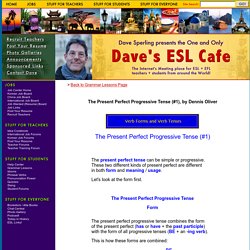
15 ways of eliciting vocabulary. Most of the ideas below can be combined (and in fact need to be!).
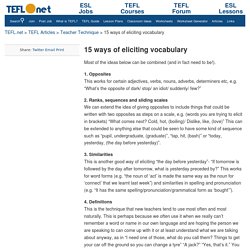
1. OppositesThis works for certain adjectives, verbs, nouns, adverbs, determiners etc, e.g. “What’s the opposite of dark/ stop/ an idiot/ suddenly/ few?” 2. EAP Tutor at Study Group. Salary: £28.33 hourly teaching rate Contract Type: Variable Hours (14 hours per week) At Study Group, our students travel from 142 different countries to study on our Higher Education preparatory courses.
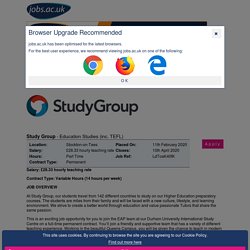
15 & 16 Focus on the learner new. Definition of Insular by Merriam-Webster. (Liu Jingxia)How to have a good lead in 2. CELTA lesson plans – back to front planning – The Cambridge CELTA Blog. Free Useful Teaching Resources. Here you will find a collection of links to some free useful resources; they're listed in alphabetical order.

The links open on a new tab or window. If you find this page useful, PLEASE tell other people about it - you can tweet, send it to Facebook, etc at the end of the page. Most of these resources have been used by me at one time or another, and the links will be constantly updated, so be sure to keep coming back! Feedback, as usual, will be much appreciated. Apps. Concept Checking Questions (CCQs) – The Ultimate Guide to CELTA. When presenting new language we have to be able to check that the students have understood the meaning, one way of doing this is to ask CCQs.
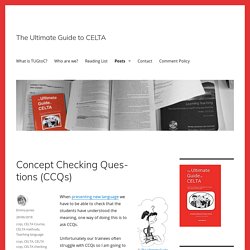
Unfortunately our trainees often struggle with CCQs so I am going to attempt to simplify them here for you. Language item: I went to New Zealand last year. Our focus is past simple to talk about something that happened in the past and is now finished so we need to ask questions that confirm the students understand this usage of the past simple. First, let’s consider the facts about this sentence: Unit 4c Teaching vocabulary 2 Concept checking. Celta trainChecking Understanding – Part 1, Instruction Checking Questions (ICQs)get on board... In our everyday life outside the classroom, when we want to check if we have been understood, the most straightforward thing to do is simply ask ’Do you understand?’ , or ‘Do you know what I mean?’. For the most part, people will tell us that they did or they didn’t. If they say they did, we are generally satisfied and move on to the next part of the conversation, and if they say they didn’t, we would usually try to re-explain and then ask again if they are clear.
However, in the ESL classroom, and on CELTAs, you will most likely be discouraged from asking these questions. Reading lesson plans: Bamboo. By Jackie McAvoy Students complete a series of activities based on a text about bamboo. Bamboo – Elementary Skills: Reading skills including recognising the main point in paragraphs, reading for gist, detail and comprehension. Includes a short dialogue role play. Pre-Teaching Vocabulary - Vocab Strategies. Definition of Strategy Pre-teaching vocabulary is a strategy in which teachers introduce students to new vocabulary words before reading a text selection that contains the new vocabulary words. According to Literacy in Context, "When teachers pre-teach vocabulary, they introduce unfamiliar terms to students before they begin to read the text, and students have a heightened awareness of the vocabulary that they will encounter while reading. " (Miller and Veatch, 2011, p.19) Adolescent Literacy states that "[pre-teaching vocabulary] facilitates the reading of new text by giving students the meanings of the words before they encounter them.
" (2007, p. 16) This strategy is particularly helpful in situations where students will encounter words that they have no familiarity with and would have trouble deciphering the word meaning from context or word analysis. Supporting Research Internet Resources. 5 Lead-in Ideas to Jump Start Your Lesson — TEFL Horizons. Write it on the board and have students talk about it for a few minutes in pairs. They can discuss what they think it means, possible interpretations, and whether they agree or disagree.
Analysing Language. Checking understanding generally follows the isolation of new language which has been presented in context, analysed and fully explained. It is this analysis and explanation stage which is the focus here. A framework for analysis Form and phonology Function and meaning Register and appropriacy Post analysis A framework for analysis The teacher may present language inductively through a text, a situation, through a task, or simply asks learners to 'notice' lexis. Alternatively a deductive approach may be used whereby the learners are given the rules and asked to apply them in using the language.
In either case the learners need to fully understand the language before they begin to practise it in guided activities, or produce it together with other 'known' language. Functions. Register and degrees of formality. TeachingEnglish. TeachingEnglish.